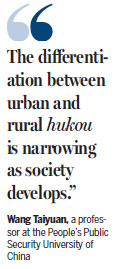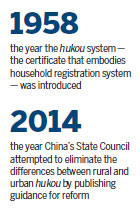

The government is scrapping the division between rural and urban citizenship in a bid to encourage greater urbanization. Du Juan reports.
Editor's note: This is the second in a series of special reports looking at the effects of the hukou, the household registration system, on the lives of ordinary citizens who have left their homes to work in other areas and regions. More reports will follow in the weeks to come.
'All my effort and sacrifices turned out to be worthwhile when I got that little piece of paper," said 57-year-old Jin Tong (not her real name), her eyes glowing with tears and pride.
"That little piece of paper" was hukou - the certificate that embodies China's household registration system - and Jin craved an urban hukou, rather than its rural counterpart.
The system was introduced in 1958, at the end of a decade in which massive construction projects were undertaken in the wake of the foundation of the People's Republic of China.

The construction wave, which saw hundreds of thousands of rural residents rush to cities in search of jobs, proved problematic because although the new workers were urgently needed, their arrival swamped government services in urban areas. As a countermeasure, the authorities announced that only rural residents with letters of introduction to employers would be allowed to leave the countryside permanently.
It was against this background that the hukou system, which drew a clear distinction between rural and urban citizenship, was officially introduced.
A dream of escape
Jin was born in a village in the suburbs of Yuncheng, a city in Shanxi province, and as she was growing up during the 1960s and 70s, her dearest dream was "to leave the place I was born".
"I was tired of doing farm work day after day. Simply being with the soil and sun was the most boring thing in life," she said. "I wanted to see the world outside my village. However, after I failed the national college entrance exam there seemed no way out."
At the time, only non-urbanites who carried student certificates, employee ID cards or military officers' cards could apply for urban hukou, so most rural people had no option but to stay in their villages.
"I visited nearby cities when I was a teenager, and I liked the clean roads, shops, schools and buildings," Jin said. "I wanted a life in a city so much more than a life farming at home."
The last straw came when her first serious relationship ended because her boyfriend's parents objected to her "rural identity", which excluded her from legally obtaining a job in a city. Moreover, in Shanxi at the time, a child's hukou was determined by their mother's status, so any children that resulted from their marriage would be classified as rural residents.

"I met my first love in high school, but, like his parents, he held urban hukou. After graduation, he listened to his parents and decided to leave me because they found him a job in Yuncheng city (which required urban hukou), while I had to stay in my village," Jin said.
After that, she decided that no child of hers would have to endure the same experience, so she moved to Yuncheng.
"I found a temporary job waiting tables in a restaurant, getting very low pay and facing the risk of dismissal at any time. I met my future husband there. He had hukou in the city. Again, when we spoke about marriage, we faced strong opposition from his family," Jin said. "Luckily, he chose to stay by my side and was determined to marry me at any cost."
Subterfuge
Despite her marriage, Jin still didn't qualify for urban hukou, so eventually she resorted to subterfuge.
Eight years after the marriage, a relative-in-law who was close to retirement agreed to exchange her urban hukou for Jin's rural certificate. The deal cost Jin and her husband a sizable sum of money and while not technically illegal - it didn't abuse the city's resources, simply substituted one name for another - it wasn't entirely legal either.
Jin said she would never forget that day in December 1995: "I finally became an urban citizen. I would never again be looked down upon because I was born in a village. My child could go to schools in the city and be treated equally like the other kids."
Although her move from rural to urban resident took 10 years, Jin has no complaints about the hukou system.
"Although I didn't receive a high level of education, I know the government has its own difficulties," she said. "China was poor at that time. Resources, such as food, education and jobs, were limited, so it was reasonable to allocate them to urban residents first. Farmers at least had land to feed themselves."
As the economy soared under the reform and opening-up policy demand for labor in cities rose quickly, leading authorities to scrap a regulation that limited rural residents' visits to cities to just six months. Those who worked in cities for long periods, usually without hukou, quickly acquired the name "migrant workers".
Inevitable result
Wang Taiyuan, a professor at the People's Public Security University of China, said the hukou system was the inevitable result of the planned economy.
"The differentiation between urban and rural hukou is narrowing as society develops," he said. "However, people with rural hukou still face obstacles in cities, such as lower wages and limited access to education and healthcare. However, the reason for this is not the system itself, but the current stage of social development."
In 2014, the State Council, China's Cabinet, published reform guidance in an attempt to eliminate the differences between rural and urban hukou. In future, they will both be called residential hukou, and although the process is ongoing, many provinces have already scrapped the distinction. Beijing abandoned it in June.
The guidance also urged the end of a ban on hukou registration in small cities to gradually ease the big cities' control of registration, although population numbers in megacities will still be strictly controlled.
By September, as many as 30 provinces and regions had published plans for reform, with some issuing clear timetables for change, and local governments have pledged to provide all residents with the same level of public services, providing they meet the registration requirements.
"The reform is aimed at giving equal rights to everyone qualified (by the type of work they do) to live in cities," Wang said.
No guarantees
In the past, people with urban hukou were provided with life's necessities, including food, jobs, education and medical services. Now, having an urban hukou doesn't guarantee an easy life, Wang said.
For example, a person who holds urban hukou in Yuncheng but works in Beijing will still face problems educating their children because only children with Beijing hukou can attend the city's public schools.
Meanwhile, about 1 million residents with Beijing hukou are unable to find work in the city, according to Wang, and many couples find it almost impossible to gain admittance to a maternity hospital because there is an acute shortage of obstetrics services.
Moreover, soaring real estate prices make it extremely difficult for residents to buy an apartment, irrespective of whether they hold Beijing hukou or not.
"It's unfair to blame the hukou system for all the challenges we meet during the country's development," said Wang, who added that in most medium and small cities, the old problems associated with urban or rural hukou are now almost non-existent.
Jin said she welcomes the reforms because they will make life easier for people like her, who long to change their lives. After all, if she had been born 30 years later, she might not have had to make so many sacrifices just to obtain "that little piece of paper".
Contact the writer at dujuan@chinadaily.com.cn
|
A police officer helps applicants to change their household registration information in Wuyi county, Zhejiang province, after the county scrapped the distinction between rural and urban hukou in April. Zhang Jiancheng / For China Daily |
|
Workers repair a road in front of newly built houses in Gongshan, a village in Rizhao city,Shandong province. The infrastructure is gradually improving in many rural areas. Fan Changguo / Xinhua |